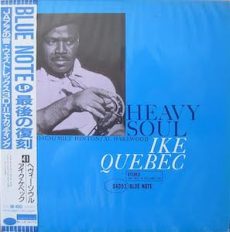
Requisites
Heavy Soul ~ Ike Quebec | By Eddie Carter
A few nights ago, I was thinking about my mom and reflecting on some of the records she loved to play while cooking dinner when my sister and I were younger. I listened to one of her favorite albums by tenor saxophonist Ike Quebec, which led me to this morning’s choice from the library. Heavy Soul (Blue Note BLP 4093/BST 84093) is a quartet date and the third of four records the label released in 1962. His bandmates on this record are Freddie Roach on organ, Milt Hinton on bass, and Al Harewood on drums. Their first appearance together was on an earlier release that year; It Might As Well Be Spring. My copy is the 1990 Toshiba-EMI Limited Japanese Stereo reissue sharing the original catalog number.
Side One kicks off with the first of three originals by Ike Quebec. Acquitted is a catchy tune that begins with a lively groove for the quartet’s theme. Ike kicks off the solos with a driving rhythm, and Freddie treats the listener to a zesty performance. The leader returns to share a few more thoughts preceding the ending theme, fading into nothingness. Just One More Chance by Sam Coslow and Arthur Johnston first appeared in the 1931 featurette, One More Chance. Quebec and company make an indelible impression on the melody, then the saxophonist leads off with a stylish performance. Freddie adds a deep sense of nostalgia in the second statement, leading to the tenor’s elegant conclusion.
Que’s Dilemma, also by Quebec, moves the beat upward for the saxophonist’s agile melody. He begins the song’s only solo with Milt and Al in the background, Freddie joins the festivities next, and Ike completes his invigorating statement into the closing chorus and disappearance. Brother, Can You Spare A Dime? by Jay Gorney and E.Y. Harburg poignantly gives a glimpse into the times during the Great Depression. The quartet presents the melody with a sad simplicity that serves as a springboard into Ike’s deeply affecting opening solo. The following presentation by Freddie is equally gentle and stunningly executed with Milt and Al’s assistance. Ike sums up the song’s story with a gorgeous reprise and finish.
Side Two gets underway with George, and Ira Gershwin’s, The Man I Love. The ensemble states the theme slowly; next, the tempo quickens for Ike to wail on the song’s only interpretation. The group slows the beat down for the closing chorus and finale. Ike’s third tune, Heavy Soul, is a down-home blues that commences with an introduction, first by Milt. Then, Ike, Al, and Freddie enter with subtly conceived statements to complete the theme. Ike draws an exceptionally tender tone from his tenor sax in the first presentation. Freddie maintains a therapeutic mood with one of his most relaxed performances. Milt has the last word and effectively walks toward the saxophonist’s ending theme, which disappears into oblivion.
I Want a Little Girl by Murray Mencher, and Billy Moll is a beautiful ballad that hasn’t been over-recorded. Ike and the rhythm section establish an affectionately exquisite theme, and he continues telling a sensitive story in the opening interpretation. Freddie emerges next with a delicately expressed reading, then Ike returns to add a heartfelt exclamation preceding the quartet’s return for the gentle climax. The album’s closing track, Nature Boy by Eden Ahbez, is a two-instrument conversation between tenor and bass. Ike creates an enchanting illustration on the opening and closing melody, and Milt provides supportive warmth and sensitivity into a charming finale. Alfred Lion produced the initial session, and Rudy Van Gelder was the recording engineer.
The reissue’s sound quality is fantastic, with a spacious soundstage that’s clear and detailed. Toshiba-EMI has also done an excellent job on the remastering, and the vinyl is quiet until the music begins. Ike Quebec was an accomplished dancer and pianist before taking up the tenor sax in his twenties. In 1940, his recording career began with the Barons of Rhythm, and he’s performed with Cab Calloway, Benny Carter, Roy Eldridge, Ella Fitzgerald, Coleman Hawkins, Hot Lips Page, and Trummy Young. Most of Ike’s discography as a leader and sideman is on Blue Note, and he also served as an arranger and talent scout for the label. He occasionally recorded during the fifties due to heroin addiction but began a comeback in 1959. Four years later, he lost his battle with lung cancer on January 16, 1963, at age forty-three.
If you’re in the mood for mellow tenor sax, I invite you to add Heavy Soul to your list the next time you are out vinyl shopping. It’s an excellent place to start discovering the music of Ike Quebec and a delightful album perfect for late-night listening or long drives with the windows down. The fast numbers crackle with excitement, and the slow tunes reveal the depths of Ike Quebec’s creative ingenuity, resulting in an easy choice for any jazz lover’s library that’s hard to beat!
~ It Might As Well Be Spring (Blue Note BLP 4105/BST 84105) – Source: Discogs.com ~ Nature Boy, The Man I Love – Source: JazzStandards.com ~ Ike Quebec, Brother, Can You Spare a Dime? – Source: Wikipedia.org ~ © 2022 by Edward Thomas Carter
More Posts: choice,classic,collectible,collector,history,instrumental,jazz,music,saxophone


